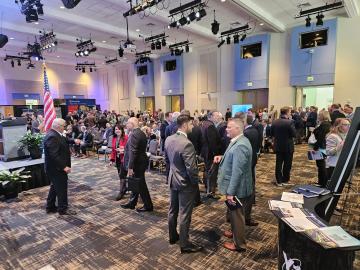
Filter News
Area of Research
- Advanced Manufacturing (2)
- Biology and Environment (49)
- Computational Engineering (1)
- Computer Science (4)
- Energy Frontier Research Centers (1)
- Energy Science (73)
- Fusion and Fission (15)
- Fusion Energy (3)
- Isotope Development and Production (1)
- Isotopes (2)
- Materials (66)
- Materials Characterization (1)
- Materials for Computing (7)
- Materials Under Extremes (1)
- National Security (21)
- Neutron Science (22)
- Nuclear Science and Technology (5)
- Quantum information Science (1)
- Supercomputing (53)
News Type
News Topics
- (-) Artificial Intelligence (44)
- (-) Computer Science (77)
- (-) Environment (78)
- (-) Fusion (27)
- (-) Grid (23)
- (-) Machine Learning (23)
- (-) Materials Science (71)
- (-) Nanotechnology (35)
- (-) Quantum Science (36)
- (-) Space Exploration (3)
- (-) Transportation (38)
- 3-D Printing/Advanced Manufacturing (62)
- Advanced Reactors (14)
- Big Data (20)
- Bioenergy (48)
- Biology (53)
- Biomedical (30)
- Biotechnology (17)
- Buildings (25)
- Chemical Sciences (44)
- Clean Water (9)
- Composites (15)
- Coronavirus (23)
- Critical Materials (13)
- Cybersecurity (23)
- Education (3)
- Element Discovery (1)
- Energy Storage (56)
- Exascale Computing (16)
- Fossil Energy (1)
- Frontier (19)
- High-Performance Computing (43)
- Hydropower (2)
- Isotopes (33)
- ITER (3)
- Materials (69)
- Mathematics (5)
- Mercury (6)
- Microelectronics (1)
- Microscopy (28)
- Molten Salt (3)
- National Security (35)
- Neutron Science (64)
- Nuclear Energy (44)
- Partnerships (33)
- Physics (42)
- Polymers (18)
- Quantum Computing (14)
- Security (19)
- Simulation (18)
- Statistics (1)
- Summit (24)
Media Contacts

Debjani Singh, a senior scientist at ORNL, leads the HydroSource project, which enhances hydropower research by making water data more accessible and useful. With a background in water resources, data science, and earth science, Singh applies innovative tools like AI to advance research. Her career, shaped by her early exposure to science in India, focuses on bridging research with practical applications.

John joined the MPEX project in 2019 and has served as project manager for several organizations within ORNL.

Seven entrepreneurs comprise the next cohort of Innovation Crossroads, a DOE Lab-Embedded Entrepreneurship Program node based at ORNL. The program provides energy-related startup founders from across the nation with access to ORNL’s unique scientific resources and capabilities, as well as connect them with experts, mentors and networks to accelerate their efforts to take their world-changing ideas to the marketplace.

Prasanna Balaprakash, director of AI programs at the Department of Energy’s Oak Ridge National Laboratory, has been appointed to Tennessee’s Artificial Intelligence Advisory Council.
The contract will be awarded to develop the newest high-performance computing system at the Oak Ridge Leadership Computing Facility.

To better predict long-term flooding risk, scientists at the Department of Energy’s Oak Ridge National Laboratory developed a 3D modeling framework that captures the complex dynamics of water as it flows across the landscape. The framework seeks to provide valuable insights into which communities are most vulnerable as the climate changes, and was developed for a project that’s assessing climate risk and mitigation pathways for an urban area along the Southeast Texas coast.

Researchers at ORNL have successfully demonstrated the first 270-kW wireless power transfer to a light-duty electric vehicle. The demonstration used a Porsche Taycan and was conducted in collaboration with Volkswagen Group of America using the ORNL-developed polyphase wireless charging system.

John Lagergren, a staff scientist in Oak Ridge National Laboratory’s Plant Systems Biology group, is using his expertise in applied math and machine learning to develop neural networks to quickly analyze the vast amounts of data on plant traits amassed at ORNL’s Advanced Plant Phenotyping Laboratory.

Vanderbilt University and ORNL announced a partnership to develop training, testing and evaluation methods that will accelerate the Department of Defense’s adoption of AI-based systems in operational environments.

Researchers at ORNL are developing battery technologies to fight climate change in two ways, by expanding the use of renewable energy and capturing airborne carbon dioxide.


